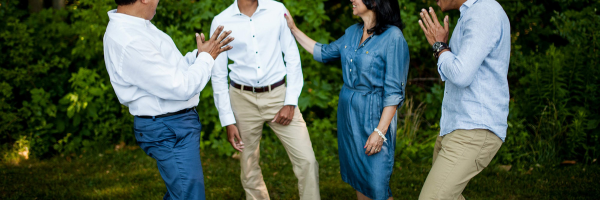The Peace and Justice Project works to reduce criminal impunity. When punishments are enforced, security will improve because victims will know that criminals who commit a crime in a poor neighborhood will be arrested. This contributes to a safer society, which is important for children.
Let’s Transform Honduras works to support an education system that’s efficient, effective, and transparent. If we have an education system where the children go to school each day, where they have good teachers and a proper learning environment, children will not be as pressured to leave. Additionally, we work for a healthcare system that provides quality medications and care. Better access to healthcare means families can have a more supportive living environment for their children to grow up in. This type of work is directly linked to immigration.
I could keep going, for example, by talking about Rescue, which provides support to young victims of sexual abuse by offering psychological counseling and seeking justice for them in the legal system. I could talk about our neighborhood legal and psychological services, our youth groups, our investigative journalism website, and more. So much of what we do relates to this issue of child immigration because the issues that lead to migration are largely the issues we are working to fix.
When you look at where in Honduras migration rates are lower, you’ll see it’s in places that are safer, where the homicide rates are lower, and where there are functioning schools – even though the people there may still be poor. It’s like a home. If there is no peace in my home, no one can live there.
For ASJ, our task is to work toward better systems for the poorest, for the most vulnerable.
We understand that there are a number of factors that lead to unaccompanied children coming to the U.S., but there’s been a particularly high amount of attention paid to the violence that these children experience in Honduras from gangs and other criminals. How does violence affect the children of Honduras?
CH:
There isn’t security and safety here, and that’s in a large part because there’s so much corruption and because the justice system has been infiltrated by organized crime. This leads to widespread impunity, where criminals are not punished for their crimes.
And who does this crime hurt the most? The poorest Hondurans – those who use public services, who live in dangerous neighborhoods without protection from the police.
Clearly, security and safety are among a number of causes for why children are leaving Honduras. Parents want to protect their children from violence, and they are willing to pay a great amount for that security.
Family is very important for Hondurans and their love for their children is very strong. They know that if their children make the trip to the U.S., those children might be abused along the way — but parents still send their children. A parent that does that must be living in a very bad situation.
For Christians, how can our faith inform our understanding of this issue?
CH:
As Christians, we must stand up for children, who are so important to God. We must understand this current crisis, offer support, and also encourage the U.S. Government to respect the rights of these children who have come to the border.
In the U.S. and in Honduras, we have to work so that governments design policies that particularly focus on the well-being of children and youth Christians can be very good at responding in emergencies – by giving food and clothes to kids – and that’s very good, but it often doesn’t fix the problem.
As we consider the issue of immigration, we must examine the factors that lead to immigration, not just the crises that emerge from it. For example, if millions of dollars were not lost annually to corruption in Honduras, there might have been opportunities to care for the needs of children here.
What is your hope for the future for Honduran children?
CH: In the short term, the future is uncertain. For the children who are sent back from the U.S., the conditions will be the same as when they left. They’ll be frustrated, disheartened, abused. It’s hard. If we remain indifferent, the current situation will grow and continue, and it will become an even bigger issue not just for us Hondurans but also for North Americans.
But I still believe that there is hope. The church in Honduras is taking on a more active role. And I believe that the situation can be changed if Christians in Honduras and outside of Honduras take on a different attitude, standing up for children around the world.
The crisis of unaccompanied minors arriving at the U.S. border is an issue that directly relates to situations children face in Honduras. As such, we’ll do our best to continue to share how ASJ’s work in Honduras relates to the situation in the U.S.



















